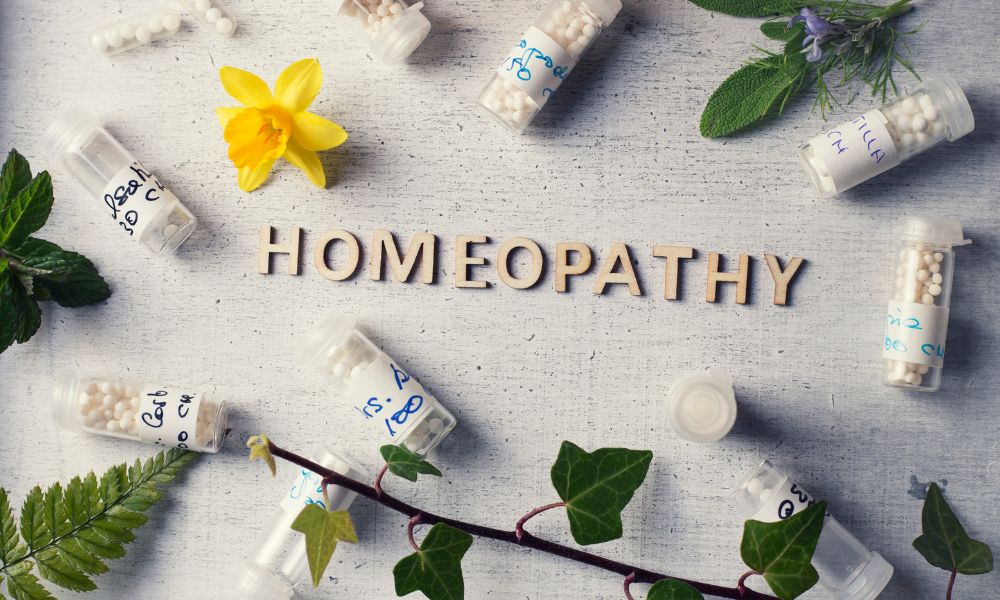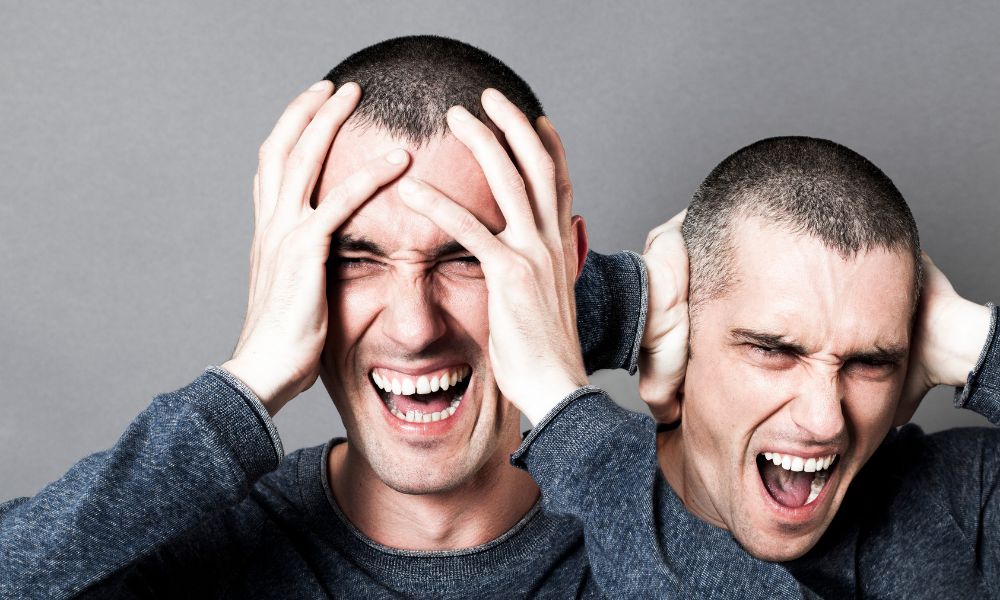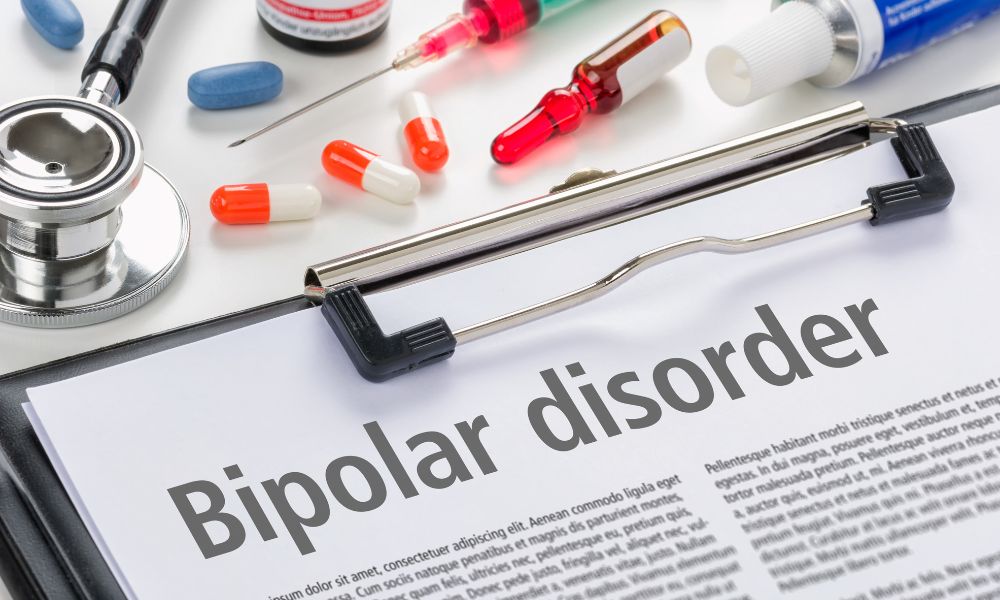Homeopathy for Bipolar Disorder– Have you ever heard of bipolar disorder? It is a condition that can cause large mood swings, ranging from feeling very happy and energetic (mania) to feeling very low and down (depression).
These mood swings can be difficult to cope with, both for the person with bipolar disorder and for those around them.
Today, we will explore something called homeopathy. It is a type of therapy that uses very natural substances to treat health problems. Some people with bipolar disorder are interested in trying homeopathy along with their regular treatment plan.
But is homeopathy really helpful for bipolar disorder? In this blog post, we’ll take a more in-depth look at what homeopathy is, how it can work for bipolar disorder, and what the science says about it. We’ll also talk about some important things to keep in mind if you’re thinking about trying homeopathy.

Understanding Homeopathy for Bipolar Disorder
Homeopathy is a type of Ayurvedic medicine, which was developed by Samuel Hahnemann in the 18th century. Its basic principle is “like cures like,” that is, if a person has a particular patient’s symptoms, then that person is treated with medicines with similar symptoms.
In homeopathy, these types of medicines are used to normalize the general condition, thereby trying to make the patient healthy naturally.
Homeopathy and allopathy are both medical systems, but they have some key differences. One main difference is that the medicines in homeopathy are naturally derived and contain excellent amounts of water or some other unique substance.
On the other hand, in allopathy, medicines are often used in large quantities in the form of metals or chemicals.
Homeopathy and allopathy both are important in their respective places. They are based on different principles from each other and can be used in different situations. Over time, according to the needs and conditions of the individual, both medical methods demonstrate their usefulness.
In this section we understood in depth the definition of homeopathy and its basic principles. How to combat it with allopathy has also been explained. (Homeopathy for Bipolar Disorder)
Historical Context of Homeopathy
Homeopathy originated in 18th century Germany, when Dr. Samuel Hahnemann developed this medical method based on his ideas and experiences. Hahnemann raised doubts on modern medical methods and developed them, the result of which became this new medical system.
He established the iconic “similia similibus curantur” principle, that is, the symptoms which are produced in one person can be cured by giving the same symptoms in the same person.
Based on this principle, Hahnemann created a new medicine named “Materia Medica”, which is used in the manufacture of homeopathic medicines. He called this method “homeopathy“, which means “treatment of common defects“.
There were many important individuals in the history of homeopathy who developed and popularized this method. Some prominent figures include:
Dr. Samuel Hahnemann: Father and first theorist of homeopathy.
Dr. Hering: Disciple of Hahnemann and promoter of homeopathy.
Dr. Kent: Prominent leader of modern homeopathy and author of the “Repertory of Homeopathic Materia Medica”.
With their contribution, these individuals developed and propagated homeopathy, due to which this medical system developed and is used throughout the world today.
In this section we understood in depth the history of homeopathy and the contribution of important people in it. (Homeopathy for Bipolar Disorder)
Bipolar Disorder: Symptoms and Challenges

Comprehensive breakdown of bipolar disorder symptoms
Bipolar disorder is a mental problem in which there is extreme change in a person’s mood. These changes are of two types:
Symptoms of Mania: In this state the person’s mood is extremely excited. He starts talking more, working more, feeling depressed and sometimes even has inappropriate behavior. Such as overspending, risky behavior like dangerous driving or taking business decisions.
Symptoms of depression: In this condition the person’s mood is very weak. He is depressed and sad, feels worthless, has sleep problems, and sometimes feels lost.
Symptoms of hypomania: This is a state of mild mania in which the person has some symptoms of mania but their effect is less. The person becomes more excited, talks more, but all this does not affect him so much.
Challenges in conventional treatment approaches
Side effects of medications: Medications can have many side effects such as sleep problems, weight gain, or worsening mental conditions.
Difficulty in timely diagnosis: Diagnosing bipolar disorder can sometimes be difficult because the symptoms of mania and depression are different from normal mental problems and changes in the person’s mood occur frequently.
Important role of patient condition and time: It is very important to take care of disease conditions and time during treatment. It is important to choose the treatment depending on the person’s conditions and mood.
It is important to understand the symptoms of bipolar disorder and face the ancient problems in its treatment.
Mechanisms of Homeopathic Treatment

Exploring how homeopathy addresses illness
How does homeopathy understand and treat disease?
The basic principle of homeopathy is “similia similibus curantur,” that is, similar symptoms occurring in one person can be cured by giving the same medicine in the same person.
This means that homeopathy medicines are given to a person with similar symptoms to those who show symptoms of the disease. With this, the causes of the disease can be fundamentally removed and the person can be made healthy.
Homeopathy medicines use common substances, such as grains obtained from plants, fruit juices, or other substances obtained from nature.
These substances do not contain the essence of infection, but they have an effect on the natural forces of the person’s body, which helps him in fighting the disease.
Thus, homeopathy tries to cure the disease by correcting the physical and mental condition of the person. Using this method, a person’s body’s natural healing abilities can be increased. (Homeopathy for Bipolar Disorder)
The concept of individualized treatment in homeopathy
What is the principle of individualized treatment in homeopathy and how it treats the individual’s condition?
An important element of homeopathy is the principle of individual treatment. This theory states that every person is arrested in the disease based on a different form of nature with a different individual nature and symptoms.
Therefore, different medicines are selected for the treatment of each person, keeping in mind his individual symptoms and conditions.
The element of individualized treatment also explains that every person’s physical and mental condition is different, and hence their treatment should also be individualized.
For example, if a person has more symptoms of mania, he is given medicine according to his symptoms, while another person has more symptoms of depression, then he is given medicine according to his symptoms.
Thus, homeopathy is based on the principle of individualized treatment, in which each person is treated taking into account the patient’s nature, symptoms and condition.
This treatment is tailored to a person’s specific circumstances and seeks to get him or her back to health as quickly as possible.
Research on Homeopathy and Bipolar Disorder

Overview of existing studies and evidence
A thorough analysis of the relationship between homeopathy and bipolar disorder is proposed, giving a brief introduction to existing research and studies.
Many studies have shown that the use of homeopathy has a positive effect on the symptoms of bipolar disorder. Apart from this, some studies have also found that homeopathic treatment can reduce the risk of recurrence of the disease and make the person permanently healthy.
This evidence shows that homeopathy can be a reputable and effective treatment method in the treatment of bipolar disorder. By using this method the symptoms of the disease can be controlled and the person can be provided comfort.
In this section we provide a brief introduction to the existing studies and evidence that helps in understanding and analyzing the relationship between homeopathy and bipolar disorder. (Homeopathy for Bipolar Disorder)
Critiques and controversies in homeopathic research
Some people have a logical and controversial view towards homeopathy, which raises some questions on homeopathic research. Some of the main logical and controversial issues are as follows:
Placebo effect: Some people believe that homeopathic medicines have a mere placebo effect, that is, making a person feel confident and their condition improves, while in fact there is no real effect.
Challenges Study Design: Some detractors believe that homeopathic research faces many challenges, such as lack of potency, poor control group behavior, and exposure to trace metals.
Methodology Used: Some believe that the methodology used in homeopathic research can also be questioned, such as time constraints, challenges conducting studies uniformly, and differential effector effects.
By analyzing these logical and controversial issues, homeopathic research tries to understand the controversy and find answers to its questions. These issues also play an important role in the depth and analysis of the research.
Homeopathic Remedies for Bipolar Disorder
Homeopathy uses natural substances compounded in specific ways to create remedies for various health conditions. Although research is ongoing, there is no general scientific evidence supporting the efficacy of homeopathy in treating bipolar disorder.
Here are some common remedies that are used in homeopathic treatment for the symptoms of bipolar disorder. Importantly, these are not cures, and their efficacy may vary from person to person:
Lachesis: This remedy is sometimes used to handle symptoms of mania such as excessive talking, irritability, and impulsive behavior.
Stramonium: This remedy can be used for symptoms such as anxiety, fear, and anger associated with mania.
Aurum metallicum: This remedy can be used for deep sadness, symptoms of depression and mental disturbance.
Ignatia: This remedy can be used to handle emotional fluctuations and permanent mood changes.
Natrum Muriaticum: This remedy can be considered for symptoms of mania and depression.
Important things to remember:
Homeopathic remedies are selected based on the individual’s specific symptoms and overall condition. A qualified homeopath will conduct a comprehensive consultation to determine the most appropriate remedy.
There is limited scientific evidence to support the efficacy of these treatments in managing bipolar illness.
It is important to discuss any homeopathic remedy with your doctor or psychiatrist so that it complements your existing treatment plan and does not interfere with the efficacy of the medications.
Keep in mind, proper medical diagnosis and treatment for bipolar disorder should be provided by a qualified healthcare professional. Homeopathy can be a complementary approach, but it should not replace conventional treatment. (Homeopathy for Bipolar Disorder)
Homeopathy as Complementary Therapy
Integrating homeopathy with conventional treatment approaches
Homeopathy can be combined with ancient healing methods to provide a person with a modern and complete treatment system. This indicates that homeopathy is a natural and effective treatment method that can be combined with other treatment methods to help a person become healthy.
Many times, patients with bipolar disorder are given homeopathic treatment along with allopathic medicines.
Thus, along with reducing the side effects of medicines, homeopathy can also be helpful in improving their mental and physical condition. These two medical methods can be understood as complementary to each other and can help in making a person permanently healthy.
Thus, by integrating homeopathy with ancient healing methods, a person can be provided with a modern and holistic treatment system that can help in enriching their mental and physical health.
Potential benefits and considerations of combined therapy
Combined therapy combines homeopathy with ancient healing methods to provide many benefits, including:
Rich Treatment: Integrative medicine provides a person with a rich treatment system that combines homeopathy and ancient healing systems. This gives the person the benefit of a modern and complete medical system which can help in enriching their mental and physical health.
Reduction of side effects of medicines: When homeopathy is given in combination with allopathic medicines, the side effects of medicines can be reduced.
This can protect the person from other problems that may occur during treatment and can help in recovering their mental and physical condition.
Treatment tailored to the individual: In combined therapy, a particular treatment may be selected according to the symptoms and condition of the individual.
This allows the individual to be provided personalized and supportive treatment tailored to their condition, thereby improving their health.
Through combined therapy, by integrating homeopathy with ancient healing practices, the individual can be provided with a rich, personalized, and supportive treatment system that can help enrich their mental and physical health.
Patient Perspectives on Homeopathy
Managing bipolar disorder can be a challenging condition, and some people explore synthetic remedies as other options alongside their traditional treatment plan. Homeopathy is one such option, and hearing from people who have used it for bipolar disorder can provide valuable experience.
Here are excerpts from some patient experiences who have used homeopathy for bipolar disorder:
Sarah (32): “I have been diagnosed with bipolar disorder for several years. Medication helped, but my moods keep changing. I tried homeopathy with my doctor’s approval, and it seems to stabilize my moods. It’s not a miracle, but it feels like a positive contribution to my treatment plan.”
Michael (45): “I was skeptical of homeopathy at first, but after struggling with how I reacted to the medication, I gave it a try. I can’t say it completely eliminated my bipolar symptoms, But it seemed to diminish their depth. It’s important to find a qualified homeopath who works with your doctor.”
Lisa (28): “Although homeopathy provided some initial relief, it was not enough to manage my bipolar disorder. Talking with my doctor, we decided to adjust my medications, and that made a big difference. Made a difference. Homeopathy can be helpful for some people, but it’s important to be realistic about its limitations.”
Remember, these are just some personal experiences.
Here are some more points to keep in mind:
Homeopathy may not be effective for all people with bipolar disorder.
Must be a sensitive and understanding healthcare professional who understands traditional and complementary approaches.
Homeopathy should not be sensitive to bipolar disorder.
If you’re considering homeopathy for bipolar disorder, it’s important to discuss it with your doctor or psychiatrist to see if it fits with your overall treatment plan.
Addressing Safety Concerns
Safety is an important issue when using homeopathic treatment methods, especially in the treatment of serious mental problems like bipolar disorder. Here, the safety margins of homeopathic remedies and the risks and precautions associated with their use are considered.
The safety margin of homeopathic medicines is important because the substances used in them have less chances of causing infection or other side effects.
These substances are naturally occurring and are helpful in enriching the physical and mental condition of a person. But, excessive use of some liquids can also cause some side effects, so they should be taken care of.
There are some risks and precautions when using homeopathy for bipolar disorder. For example, if a person is regularly using allopathic medicines, they should consult their doctor before starting homeopathic treatment. Furthermore, homeopathic medicines should only be used as an ideal treatment, and one needs to regularly monitor their effectiveness and results.
Considering all these issues, homeopathy is very important in making the treatment safe and effective for patients with bipolar disorder. This can motivate a person to lead a sustainable and healthy life, as well as enrich his mental and physical condition.
The Role of the Homeopath
A homeopath, or homeopathic physician, is a person who has knowledge of homeopathy and uses it in the treatment of disease. There are some core qualifications and responsibilities to be a homeopath, which explain their importance in this field.
The qualifications required for homeopathic physicians include a high level of education and training. They receive specialized education and training that provides them with an understanding and mastery of homeopathic philosophy and practice.
Furthermore, the homeopath must have the ability to understand the mental and physical condition of the person so that they can decide the right treatment.
Holistic vision is important among the responsibilities of homeopathic physicians. They do not just look at a person’s symptoms based on their symptoms, but also take into account their lifestyle, experiences, and mental state.
Thus, they decide the treatment by understanding all the dimensions of the person, so that the root cause of the disease can be removed and the person can be made permanently healthy.
A holistic view is important in homeopathic care, as the method considers the physical and mental state of the individual simultaneously and incorporates this view into treatment. Thus, homeopaths do not just try to free the person from the disease but also lead them towards a stable and healthy life.
Thus, the importance of a homeopathic physician lies in his qualifications and holistic vision, which helps in leading a person towards a stable and prosperous life. (Homeopathy for Bipolar Disorder)
Challenges and Limitations of Homeopathy
Homeopathy is a well-known treatment modality in the treatment of bipolar disease, but it also has some challenges and limitations.
It is important to understand these challenges and find solutions to them so that homeopathic treatment can be further improved. A major challenge in homeopathic treatment lies in correctly identifying the symptoms of bipolar disease.
Because the symptoms of bipolar disorder are not stable and change over time, it can be difficult to diagnose them correctly. Additionally, homeopathy treatment is individualized, so choosing the right medicine for each patient can be a challenge.
Another challenge in homeopathic treatment, especially for bipolar disease, is that sometimes the effects of the medicines may vary or change over time. This means that some patients do not get the desired effect from the medicines immediately, and may have to try several different medicines.
Thus, the healing period requires even more time and patience. Qualitative homeopathic medicines present another challenge.
Since the effects of the medicines used in homeopathy are natural, it is important to understand and take care of their special properties and uses. There may also be difficulties in timely use of medicines and timely treatment.
Along with all these challenges, homeopathy treatment for bipolar disease requires even more research and improvement. For homeopathic remedies to be developed and widely used, much more expertise and research is needed.
Thus, there is importance of holistic training, research and development to make homeopathy treatments even more effective and safe. Homeopathic treatment of bipolar disorder requires further development and improvement. (Homeopathy for Bipolar Disorder)
Integrative Approaches to Mental Health

Expansion into comprehensive mental health care
Expanding on the inclusive practice of mental health, we see a new and powerful movement growing today known as ‘inclusive mental health therapy’. The main objective of this movement is to provide an enabler that keeps a person healthy at the physical, mental, and emotional levels.
Thus, this movement combines different medical systems, such as allopathy, ayurveda, yoga, pranayam, and homeopathy, together to provide complete and holistic healing to the individual.
Homeopathy’s place in inclusive medical systems
Homeopathy is a type of holistic medical system that helps in enriching the physical and mental condition of a person. Natural medicines are used in this which solve the symptoms of the person by understanding the root cause of his disease.
Homeopathic treatment looks at the individual’s soul and physical organs as mediums, and thus seeks to understand and enrich his overall health condition.
Homeopathy has a place among the inclusive medical systems because this medical system urges the person towards a permanent and healthy life.
The medicines in it are natural and effective, and their use is important in the lasting and prosperous treatment of the individual patients. The main objective of homeopathy treatment is to maintain complete health of the person at physical, mental and emotional level.
Thus, by having a place in homeopathy in inclusive medical systems, complete and holistic treatment can be provided to the person which helps in making his mental health stable and prosperous. (Homeopathy for Bipolar Disorder)
The Intersection of Hearing Loss and Anxiety: Understanding the Relationship and Coping Strategies
Ethical Considerations in Homeopathic Practice
The aim of creating ethical standards for homeopathic physicians is so that physicians can serve the person considering his welfare and prosperity as important. These moral memories provide guidance toward competence, behavior, and responsibilities. Some of the main moral memories are as follows:
Supporting the individual’s self-reliance: The homeopathic physician should support the individual’s independence and decision-making. Based on the individual’s own freedom, the physician should provide communication to them and support them in their treatment.
Written consent and informed consent: The homeopathic practitioner must have written and informed consent with the individual. They must provide the person with accurate and complete information about their treatment so that the person can understand and properly consent to their decision.
Dignity and transparency of the individual: The homeopathic physician must respect the dignity of the individual and their personal rights. The Vaidya should behave with respect and diligence in cooperation and communication with the person, otherwise the person’s trust in him may fail.
Attention to the suitability of the person: Homeopathic physicians should take care of the suitability of the person. Every person is different, so their medical system should also be different. The physician should consider individualized treatment to lead the person to permanent and holistic health.
Through these ethical memories, homeopathic physicians can serve the individual while remaining dedicated to their well-being and prosperity. In this way, the person can be helped to lead a sustainable and healthy life. (Homeopathy for Bipolar Disorder)
Debunking Myths and Misconceptions
Bipolar disorder is a complex condition, and there can be a lot of confusion about its treatment options. Here, we will discuss some common misconceptions about homeopathy and its use in bipolar disorder management:
Myth #1: Homeopathy is a sugar pill that has no effect.
Explanation: Homeopathic remedies are made by extremely diluting sensitive substances, but some research suggests they may have effects beyond placebo. More research is needed to understand how they work.
Myth #2: Homeopathy can completely cure bipolar disorder.
Explanation: There is currently no cure for bipolar disorder. Homeopathy can help control symptoms, but it is not a replacement for traditional treatment plans.
Myth #3: Homeopathy is safe for all bipolar disorders.
Explanation: It is generally accepted that homeopathic remedies can interact with other medicines. It is important to consult a doctor before starting homeopathy.
Myth #4: Homeopathy is a quick fix for bipolar disorder.
Explanation: Finding the right homeopathic remedy often takes time and experimentation. Managing bipolar disorder requires a long-term approach.
Myth #5: You don’t need a doctor when using homeopathy.
Explanation: A qualified health care professional can help design a positive and effective treatment plan that may include both conservative and supportive measures.
By understanding these misconceptions, you can make informed decisions about how to manage your bipolar disorder.
Keep a few more ideas in mind:
Homeopathy is not a mainstream medical treatment, and research on its efficacy for bipolar disorder is limited.
There are potential risks or reactions with other medications, so consulting a doctor is essential.
Having open conversations with your doctor is important to determine your individual needs and create a holistic treatment plan.
Keep in mind: Bipolar disorder is a serious condition. Always prefer the advice of a qualified health care professional when deciding on your treatment plan.
Disclaimer:
This information is for educational purposes only and should not be construed as medical advice. Please consult with a qualified healthcare professional for diagnosis and treatment of bipolar disorder or any other medical condition. Homeopathy is not a substitute for conventional medical treatment. Individual experiences with homeopathy may vary.
Exploring Facts, Stats, and Resources
Homeopathy for bipolar disorder remains a controversial topic. While some people find relief through homeopathy, there is limited scientific evidence to support its widespread use for this condition.
Here’s a breakdown of some key facts and stats:
- Limited Research: A 2016 review published in the journal Cochrane Database of Systematic Reviews (https://www.cochrane.org/CD005974/ARI_what-are-benefits-and-risks-oral-homeopathic-medicines-preventing-and-treating-acute-respiratory) analyzed 44 studies on homeopathy for various health conditions, including mental health. The review concluded that “the evidence is currently insufficient to draw any conclusions about the effectiveness of homeopathy for any health condition.”
- Potential Benefits: Some smaller studies suggest that homeopathy may offer limited benefits for managing bipolar disorder symptoms, such as mood swings and anxiety. However, these studies often lack methodological rigor, making it difficult to draw definitive conclusions.
- Safety Considerations: Homeopathic remedies are generally considered safe, but they can interact with other medications. Consulting a doctor before starting homeopathy is crucial to avoid any potential risks.
Important Resources:
- National Center for Complementary and Integrative Health (NCCIH):https://www.nccih.nih.gov/
- The NCCIH is a US government agency that provides information on complementary and integrative health practices, including homeopathy. Their website offers unbiased reviews of the scientific evidence for various therapies.
- American Psychiatric Association (APA):https://www.psychiatry.org/
- The APA is a leading professional organization for psychiatrists. Their website provides information on evidence-based treatments for bipolar disorder.
- Society of Homeopaths (UK):https://homeopathy-soh.org/
- The Society of Homeopaths is a professional organization for homeopaths in the UK. Their website offers information on homeopathy, but it’s important to be aware that they may have a bias towards the practice.
Finding the Right Treatment for Bipolar Disorder:
If you are considering homeopathy for bipolar disorder, it’s important to discuss it openly with your doctor or psychiatrist. They can help you weigh the potential benefits and risks and determine if homeopathy might be a suitable addition to your existing treatment plan.
Remember:
- Bipolar disorder is a serious condition.
- Always prioritize the advice of a qualified healthcare professional when making decisions about your treatment plan.
- Open communication with your doctor is key to creating a holistic treatment plan that addresses your individual needs.
Here are some resources that can provide support and connect you with qualified professionals:
Helplines:
- National Alliance on Mental Illness (NAMI) Helpline: 1-800-950-NAMI (6264) or https://www.nami.org/Home
- NAMI is a leading mental health advocacy organization offering a free helpline with information and support for individuals and families facing mental illness.
- Substance Abuse and Mental Health Services Administration (SAMHSA) National Helpline: 1-800-662-HELP (4357) or https://www.samhsa.gov/
- SAMHSA is a US government agency focusing on mental health and substance abuse. Their helpline provides free and confidential information on mental health issues, including bipolar disorder, and can connect you to treatment facilities.
- Crisis Text Line: Text HOME to 741741
- This service provides confidential crisis intervention support via text messaging.
Remember: You are not alone. Help is available, and there is hope for managing bipolar disorder and living a fulfilling life. Don’t hesitate to reach out to a helpline for mental health professionals for support.
Conclusion
In conclusion, this article has explored homeopathy, a medical system that emphasizes holistic care and natural remedies. We discussed its potential benefits for certain conditions, as well as the ongoing scientific debate surrounding its effectiveness.
Homeopathy can be a complementary approach to traditional medicine, but it’s important to consult with a qualified healthcare professional before starting any new treatment, including homeopathy.
Remember, bipolar disorder is a serious condition, and conventional treatment remains the cornerstone of managing this illness. (Homeopathy for Bipolar Disorder)
I hope you have liked the information we have shared in our article, to know more about this you can read our other article too.
Frequently Asked Questions (FAQs)
Q: Can homeopathy effectively treat bipolar disorder?
A: While some individuals may find relief from certain symptoms with homeopathic remedies, it is not considered a primary treatment for bipolar disorder. It is important for individuals with bipolar disorder to work closely with their healthcare providers to develop a comprehensive treatment plan that may include medication, therapy, and lifestyle changes.
Q: Are homeopathic remedies safe for managing bipolar disorder?
A: Homeopathic remedies are generally considered safe when used as directed. However, it is crucial for individuals with bipolar disorder to consult with a qualified healthcare professional before starting any new treatment, as homeopathic remedies may interact with other medications or therapies.
Q: Is there scientific evidence supporting the effectiveness of homeopathy for bipolar disorder?
A: Currently, there is limited scientific evidence to support the use of homeopathy as a primary treatment for bipolar disorder. While some studies suggest potential benefits, more research is needed to fully understand its effectiveness and mechanisms of action.
Q: Can homeopathy cure bipolar disorder completely?
A: There is no cure for bipolar disorder, and homeopathy is not considered a cure. Instead, it may help manage symptoms and improve overall well-being as part of a comprehensive treatment plan.
Q: Are there any risks associated with using homeopathy for bipolar disorder?
A: While homeopathic remedies are generally considered safe, there is a risk of interactions with other medications or therapies. It is important for individuals with bipolar disorder to discuss their treatment options with a healthcare professional to minimize any potential risks.
Q: How do homeopathic remedies differ from conventional medications for bipolar disorder?
A: Homeopathic remedies are highly diluted substances derived from natural sources, while conventional medications for bipolar disorder typically include synthetic compounds that directly target specific symptoms or neurotransmitters in the brain.
Q: Can homeopathy be used alongside conventional treatments for bipolar disorder?
A: Yes, homeopathy can be used as a complementary therapy alongside conventional treatments for bipolar disorder. However, it is important for individuals to inform their healthcare providers about all treatments they are using to ensure safe and effective management of their condition.
Q: How long does it take to see results from homeopathic treatment for bipolar disorder?
A: The timeline for seeing results from homeopathic treatment can vary depending on the individual and the specific remedies used. Some individuals may experience improvements in symptoms relatively quickly, while others may require longer-term treatment to see significant changes.
Q: Are there any lifestyle changes that complement homeopathic treatment for bipolar disorder?
A: Yes, lifestyle changes such as maintaining a healthy diet, getting regular exercise, managing stress, and getting enough sleep can complement homeopathic treatment for bipolar disorder and contribute to overall well-being.